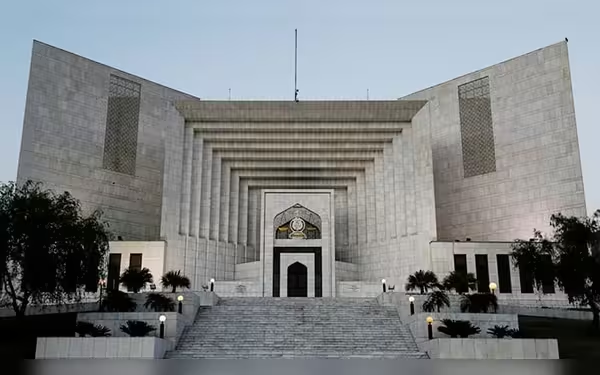Saturday, November 16, 2024 07:29 PM
Pakistan Bar Council Condemns Supreme Court Ordinance as Bad Law
- Lawyer bodies criticize ordinance for threatening judicial independence.
- Amendments to case scheduling raise concerns among legal experts.
- Legal community warns of potential collision between parliament and judiciary.
 Image Credits: geo
Image Credits: geoThe Pakistan Bar Council criticizes the new Supreme Court Ordinance, calling it a bad law that threatens judicial independence and fundamental rights.
In a significant development, the government of Pakistan has recently enacted the Supreme Court (Practice and Procedure) Amendment Ordinance 2024. This move has sparked widespread criticism from various lawyer bodies across the nation, who have labeled the ordinance as a "bad law." The primary concern revolves around the potential threat this legislation poses to the independence of the judiciary and the safeguarding of fundamental rights.
The ordinance was signed into law by President Asif Ali Zardari after receiving approval from the federal cabinet. It introduces changes to the existing Practice and Procedure Act, particularly in Section 2, which outlines how cases will be scheduled for hearing. According to the new provisions, a committee consisting of the chief justice, the most senior judge, and a judge nominated by the chief justice will be responsible for fixing cases for hearing. This structure has raised alarms among legal experts, who argue that it undermines the established democratic processes.
Furthermore, the ordinance amends Section 3 of the Act, stipulating that each case must be heard in its designated order. If a case is to be heard out of turn, a valid reason must be provided. The ordinance also mandates that all cases and appeals will be recorded, with transcripts made available to the public. While transparency is essential, critics argue that the manner in which this ordinance was introduced raises serious questions about its intent and implications.
Farooq H Naek, Vice Chairman of the Pakistan Bar Council (PBC), has been vocal in his opposition to the ordinance, describing it as an unjust law that violates the democratic procedure for forming a bench. He emphasized that this legislation is detrimental to the independence of the judiciary and the protection of fundamental rights, particularly those invoked under Article 184(3) of the Constitution. Naek pointed out that the legal community has long advocated for a committee of senior judges to oversee the constitution of benches and the scheduling of cases, making the recent amendments a blatant disregard for their efforts.
Similarly, the Supreme Court Bar Association (SCBA), led by President Muhammad Shahzad Shaukat and Secretary Syed Ali Imran, has expressed grave concerns regarding the timing and method of the ordinance's promulgation. They argue that the law effectively repeals the SC Practice and Procedure Act, which had already been upheld by the Supreme Court. The SCBA officials warned that the ongoing tensions between institutions like parliament and the judiciary could lead to a collision course, jeopardizing democracy and the supremacy of the Constitution.
As the legal community rallies against this ordinance, it is crucial to reflect on the broader implications of such legislative actions. The independence of the judiciary is a cornerstone of democracy, and any attempts to undermine it can have far-reaching consequences. It is imperative for all stakeholders, including the government, legal professionals, and civil society, to engage in constructive dialogue to ensure that the rule of law is upheld and that the rights of citizens are protected. The future of Pakistan's democracy hinges on the ability of its institutions to work collaboratively and respect the principles enshrined in the Constitution.













